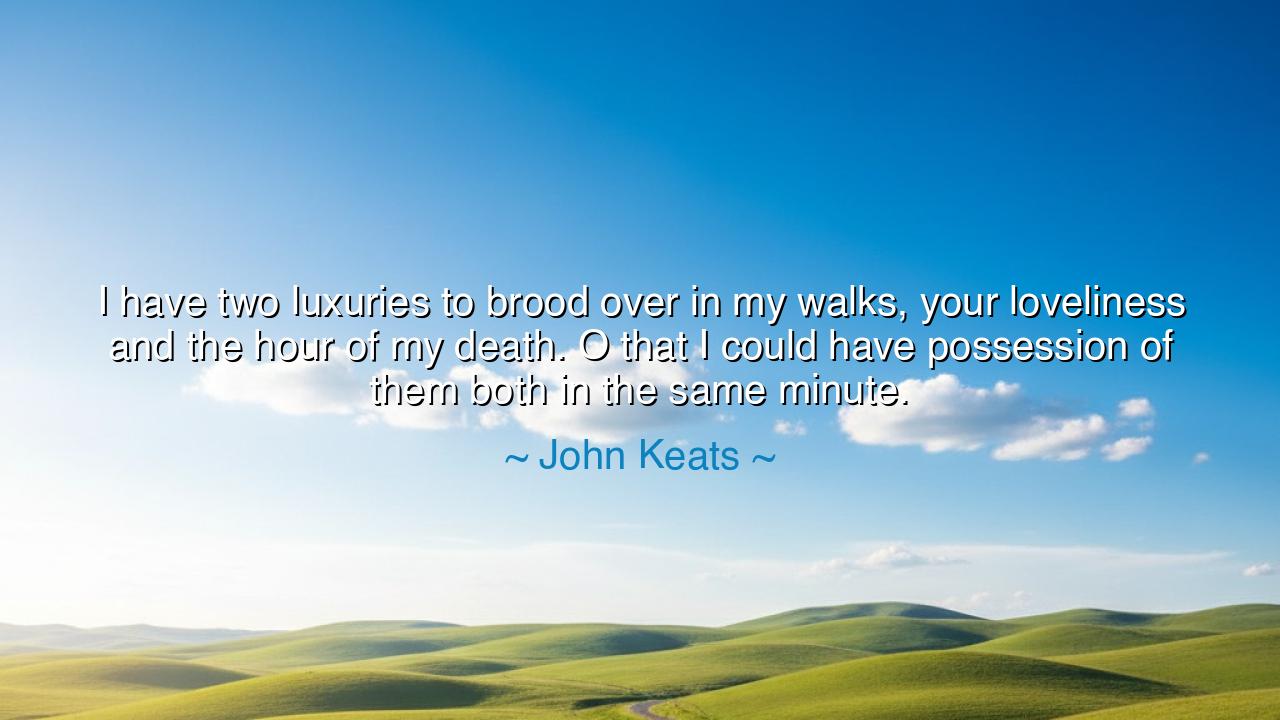
I have two luxuries to brood over in my walks, your loveliness
I have two luxuries to brood over in my walks, your loveliness and the hour of my death. O that I could have possession of them both in the same minute.






“I have two luxuries to brood over in my walks, your loveliness and the hour of my death. O that I could have possession of them both in the same minute.” — so wrote John Keats, the poet of mortal beauty and eternal longing, whose soul burned as brightly as it was brief. In these words, he binds together two of the deepest forces that stir the human heart — love and death — not as enemies, but as twin stars in the same dark sky. For to Keats, beauty and mortality were not opposites; they were inseparable, each giving meaning to the other. The poet, standing between passion and oblivion, longed to be consumed by both — to love so deeply that death itself became part of the ecstasy.
To the ancients, this would have been the song of a soul aware of its finitude. Keats, ever conscious of his frail body and brief years, knew that life’s beauty is intensified by its impermanence. The flower is more precious because it fades, the dawn more wondrous because it will soon vanish. Thus, when he spoke of “your loveliness” and “the hour of my death,” he was not despairing, but celebrating the fragile miracle of being alive. He wished, in that burning moment, to hold both beauty and finality — to taste the perfection of love and the release of mortality in one breath, one heartbeat, one rapture that would transcend the boundaries of time.
This yearning recalls the tale of Orpheus and Eurydice, sung by the poets of Greece. Orpheus loved his bride so fiercely that he journeyed into the underworld to reclaim her from death. His song was so tender, so filled with divine sorrow, that even the heart of Hades was moved. Yet when he looked back too soon, she vanished once more into shadow. Like Keats, Orpheus sought to unite love and death — to defy the limits of mortal existence through the intensity of feeling. Both remind us that passion, when pure and absolute, longs to overcome separation, to conquer even the final silence.
In this, Keats speaks for every soul that has ever loved deeply. To love truly is to stand at the edge of life’s mystery — to know that what you cherish most can be taken in an instant, and yet to love still. For the heart that loves without restraint is always flirting with the abyss, aware that the greater the beauty, the nearer the sorrow. And yet this is the nobility of love: it chooses vulnerability over safety, fire over comfort, truth over endurance. Keats’s words are not a lament, but a triumph — the declaration of one who would rather die in the fullness of passion than live a long life untouched by wonder.
There is a lesson here for all who walk beneath the sun: to love is to risk, and yet to risk is to live. The ancients taught that the gods envy mortals not for their strength, but for their fleetingness — because a mortal’s joy, unlike the gods’, is made radiant by its fragility. Each moment, precisely because it will never return, becomes sacred. Keats understood this divine paradox. In his brief twenty-five years, he wrote as though every word were his last, every verse a bridge between beauty and eternity. His body weakened, but his spirit blazed, teaching that the human heart, though doomed to die, is capable of immortal feeling.
And so, dear listener, remember this truth: do not flee from the awareness of death, nor from the depth of love. They are not your enemies, but your teachers. Let beauty pierce you, even when it brings sorrow; let love humble you, even when it demands pain. Walk, as Keats did, with both sweetness and darkness beside you, and learn to see how they complete each other. For only when you face the shadow can you truly behold the light.
In your own life, take this teaching to heart: cherish what is before you — the face you love, the sunrise through your window, the laughter that fills your day — for all of it is fleeting, and therein lies its holiness. Speak your love while you can, create while you breathe, and live so fully that when death comes, it finds you radiant. For in that sacred union of passion and impermanence, you will know, as Keats knew, the deepest truth of existence: that to love and to die are both to be truly alive.






AAdministratorAdministrator
Welcome, honored guests. Please leave a comment, we will respond soon